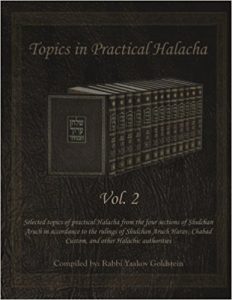
This Halacha is an excerpt from our Sefer
Buy me here or on Amazon.com
Does baby formula require a Hashgacha?[1]
Baby formula which serves as an alternative to breast milk contain various Kashrus concerns including, non-Kosher milk and non-Kosher animal products which are used to create the vital nutrients necessary for the infant.[2] Accordingly, one is to beware to only purchase baby formulas under a reliable Hashgacha. This applies towards all baby formula’s, whether dairy or soy. In the past, there were no dairy baby formula’s available with a Hashgacha, due to the inability to produce the Chalav Yisrael milk powder. Today, there are various companies which carry a Mehadrin Chalav Yisrael Hashgacha for dairy formula, such as Materna [Eida Hachareidis]; Similac [Iggud Harabanim-Westheim]; Kendamil [Kadasia UK]. Other dairy formulas are available under an OUD Hashgacha and are not Chalav Yisrael.
What to do in a case that there is no alternative: In a case that there is no Mehadrin formula available[3] and there is no alternative food that the baby can be fed, then the infant may consume non-Chalav Yisrael baby formula that is under Rabbinical supervision [such as OUD]. If there is no formula available under Rabbinical supervision available which the infant can consume, then the infant may be given even non-Kosher formula, in the situation that no other food alternative is available.[4] In such a case, it is also best to mix the formula with an edible but bitter substance, if the infant is willing to consume it.[5] In all cases, when using non-Kosher formula, one is to designate separate utensils for its use, and is not to use these utensils with other Kosher foods. Likewise, one is to monitor when using the formula becomes no longer necessary, or an alternative option becomes available.[6]
________________________________________________________________________________
[1] See Hakashrus 8/23-24; Hakashrut Kehalacha [Edry] 45/26 [p. 421]
[2] Non-Kosher milk: One of the major ingredients in baby formula is powdered milk, as well as powdered Casein which is a protein product found in milk. In the past, Casein was only produced in Chalav Akum plants. Both the powdered milk and Casein face the issue of Chalav Akum. According to some Poskim, powdered milk does not contain a prohibition of Chalav Akum [Har Tzevi Y.D. 113; Rav Yosef Mashash in Otzer Hamichtavim 3/1392; Shearim Hametzuyanim Behalacha 38 in name of Zekan Ahromn; Tzitz Eliezer 16/25; Yalkut Yosef 81/14] while according to other Poskim it does contain a prohibition of Chalav Akum. [Chazon Ish Y.D. 41/4; Teshuvos Vehanhagos 1/141; 2/373; Rav Mordechai Eliyahu in Mamar Mordechai 1/155; See Avnei Nezer 103; Divrei Yisrael] In addition, the powdered casein is extracted through the use of an enzyme or rennet which in many instances is a non-Kosher animal derivative, hence entering the prohibition of Gevinas Akum. [See Hakashrus ibid footnote 24 that Casein is not available in Chalav Yisrael plants and that it is derived from the whey of the milk which is subject to dispute into whether it carries the prohibition of Chalav Akum.]
Non-Kosher animal products: Since infant formula is designed to emulate mother’s milk, it must contain a source of fat, protein, amino acids, vitamins, minerals, sugar, and other micro nutrients. Fatty acids that are ideal for infant nutrition may be of animal origin. Vitamins may come from non-Kosher fish or from animal organs. Micro nutrients can be derived from an array of non-Kosher sources. All may be found in infant formula. Reading the label” is a very inadequate means of ascertaining the Kosher status of an infant formula, since potentially non-Kosher ingredients may be listed in a seemingly innocuous manner. For example, beef fat is commonly referred to as “oleo,” and “natural vitamins” may be obtained from non-Kosher fish oil.
[3] Such as one who is stuck in an area without Kosher baby formula, and there are no alternative options of feeding available. Or, one whose doctor instructed the child to have a specific type of formula which does not contain a Kashrus supervision.
[4] Hakashrut Kehalacha [Edry] 45/26 [p. 421]
The reason: As a) This may lead to Sakana. and b) There are various Halachic disputes associated with the Kashrus status of the ingredients, and possibly, at the very most it would only be a Rabbinical prohibition [such as Chalav Akum, Gevinas Akum, animal products are nullified in 60x], of which some Poskim rule may even initially be fed to a child if he is in need of it, even if he is not in danger. However, in such a case, it is best to have it done through a gentile. [See Admur 343/6]
[5] Making a food bitter and inedible removes its non-Kashrus status from a Biblical level, and is only forbidden Rabbinically due to Achshavei, which would not apply to a sick person or infant without eating alternative. [See Rambam Yesodei Hatorah 5/8 “Or he is fed something that has a bitter substance mixed with the non-Kosher food”; Rama Y.D. 155/3; Yad Avraham Y.D. ibid; Admur 442/22 and 30; Kaf Hachaim 554/34; Hakashrus 21/12]
[6] Hakashrut Kehalacha [Edry] 45/26 [p. 421]



Leave A Comment?
You must be logged in to post a comment.